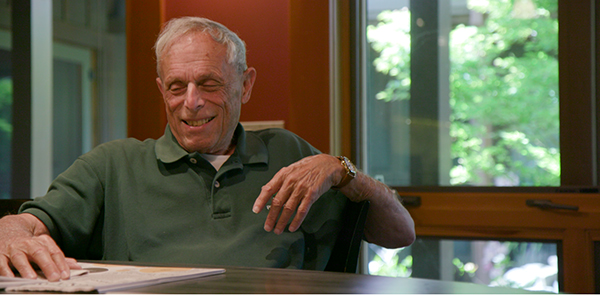Dick Levy spent his professional career supplying ultra- high-tech devices to the healthcare industry. Under his leadership, Silicon Valley tech firm Varian Medical Systems revolutionized cancer treatment with its linear accelerators, which use high doses of precisely targeted radiation to destroy tumors while sparing healthy tissue. Dick, who holds a Ph.D. in nuclear chemistry from the University of California, Berkeley, led Varian’s medical business from 1999 to 2006 and served as board chairman until 2014.
We want to improve the way all cancer patients are treated long-term.
More recently, however, Dick has steered his efforts—and his generosity—in a different direction. Now in retirement, the longtime Sutter Health and Palo Alto Medical Foundation board member and donor champions low-tech healthcare solutions. He firmly believes that nutritional support, psychological counseling and other basic but vital services have just as much power to transform healthcare as the latest technology, if not more.
“I think we’ve over-stressed high-tech solutions and under- stressed the low-tech solutions that patients need to manage chronic illnesses in ways that are cheaper and might even provide better results,” Dick says. “The healthcare system of the past 150 years is optimized for episodic care—curing sick patients—but now we must focus on keeping people healthy on the front end. We also need to manage those with chronic conditions more effectively, as well as patients during and after intense medical treatments.”
Dick acknowledges that reshaping healthcare in this fashion won’t be easy. But he believes PAMF—which serves more than 1 million patients across Alameda, Contra Costa, San Mateo, Santa Clara and Santa Cruz counties—is perfectly suited to lead the way. PAMF is a pioneer in using an advanced electronic health record to enable a coordinated care network with more than 50 locations and access to hundreds of specialists. Dick and his wife, Sue, have experienced PAMF’s high level of care firsthand as patients for several decades.
“PAMF is a very creative, very advanced-thinking organization that leads not only in Silicon Valley but across the country, putting it in a good position to drive such a change,” Dick adds. “The diversity of the PAMF and Sutter Health population—the patients and doctors—is one of the network’s greatest strengths and why I believe it is well positioned for the future.”
Low-Tech, High Reward
Dick has long been enthusiastic about investing in healthcare’s future. In the 1980s, he partnered with Dartmouth College, where he earned his bachelor’s degree, to examine healthcare reform as co-chair of the Dartmouth Institute for Health Policy and Clinical Practice’s advisory committee. His commitment to research, along with his business acumen, has been a guiding force for PAMF and Sutter Health for years.
“Research is one way I can see that Sue and I are making a difference with our philanthropy,” Dick says. “For example, we once sponsored a program between PAMF and Stanford to study the effectiveness of various interventions on breast cancer patients. That led to six journal publications on this unique way of looking at breast cancer.”
Over the past year and a half, Dick participated in a Sutter Health oncology workgroup that included a caucus of physicians and leaders from PAMF and Mills-Peninsula Medical Center. Led by Conrad Vial, M.D., senior vice president and chief clinical officer at Sutter Health, the group reimagined the journey of a local cancer patient, identifying steps to ease that journey in the future.
“This experience allowed me to see the excitement of doctors, nurses and clinicians in thinking about a new way of doing things in cancer treatment,” Dick says. “We want to improve the way all cancer patients are treated long-term, and this group was fired up for change—nothing compares to that.”
Currently, many critical aspects of cancer care, such as exercise programs, nutrition services, psychological support and even transportation to and from treatments, are not paid for by health insurance or government reimbursements. While these low-tech approaches may not cure cancer, they are no less important because they help prevent future emergency department visits and hospital admissions. “Even without reimbursement, they are the right services to offer, the right thing to do,” Dick stresses.
What’s more, this constellation of low-tech services ultimately lowers the total cost of care. The average life expectancy of a cancer survivor after treatment is more than five years, and follow-up care can be expensive for both patients and care centers.
“With 17 million people living with cancer, the costs add up, and we have an opportunity to do a lot better helping these patients in the future,” Dick says. This is true not only for people with cancer, he adds, but for those managing other chronic illnesses as well.
Putting PAMF at the Forefront
To jumpstart this shift and help position PAMF, Mills-Peninsula and
Sutter Health as leaders in healthcare’s evolution, Dick and Sue have given an invaluable gift of $10 million to establish the Center for Transformative Cancer Care Campaign.
“When I think of philanthropy through the lens of impact, it thrills me to see our grateful patients understand that their impact on healthcare is monumental and universal,” says Raya Elias-Petros, vice president of philanthropy, Sutter Health Bay Area. “Dick and Sue are truly visionary in the way they view their impact as investors in our shared mission.”
As Dick sees it, there will always be researchers pursuing new cures and philanthropists funding technologies to treat disease. “But my enthusiasm for low-tech approaches will guide our work toward transforming healthcare,” he says. “I’m not a believer in giving money to organizations to thank them for doing good—I want to be involved and work for progress in specific ways for the system. I am excited about healthcare becoming cheaper, more convenient and better aligned with patient needs.”









